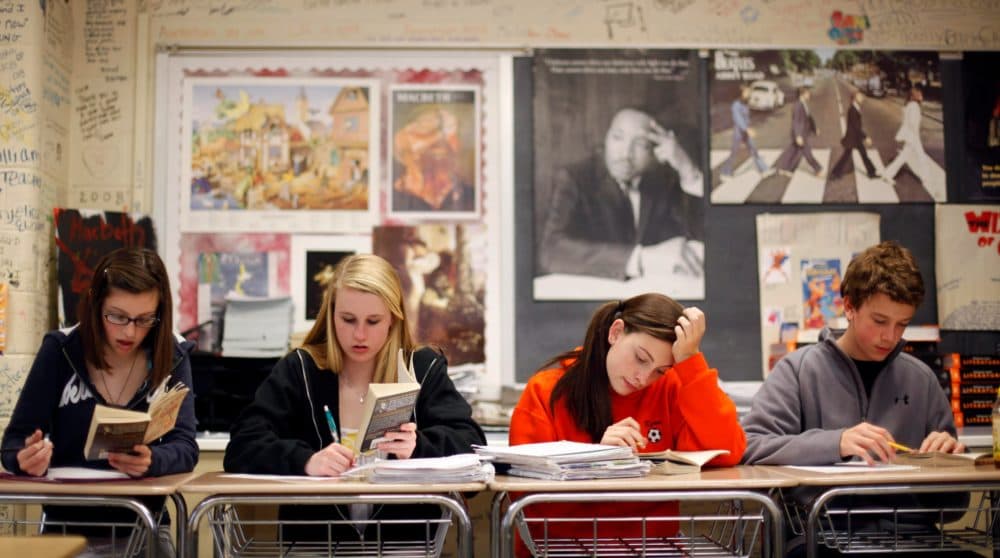Advertisement
Commentary
ChatGPT may doom high school English classes like mine. Maybe that’s not so bad

Many of my high school students admit that they have already started using ChatGPT to take history notes, solve complex math problems and analyze French poetry. In a recent essay in "The Atlantic," Daniel Herman describes how the artificial intelligence chatbot threatens high school English classes. Feed the bot any prompt, and it is remarkably good at producing clear, coherent and insightful pieces of literary analysis.
After 25 years of teaching high school, I know that I am not going to persuade my students not to cheat. They’ve already tried to convince me that asking ChatGPT to write their college essays for them is no different than using Grammarly to correct their dangling modifiers. Even my most conscientious students have confessed that they would use the bot, which launched three weeks ago, for any assignment that felt like busy work.
High school writing, as we know it, is doomed. My hope, though, is that we don’t respond to AI by trying to outwit it: by investing in software that can detect potential cheating or by asking students to write on-demand essays in class with number two pencils. Instead, I hope that we let this new technology disrupt the systems that encourage students to think of school as a game and that we view it, as Jal Mehta wrote of the pandemic, as “an opportunity to make a pivot that we should have made long ago.”
This is something that I’ve been thinking about for many years, ever since I first read Teresa Amabile’s research on creativity. In her componential theory of creativity, Amabile states that in order for an individual to do anything creative, they need the following three traits: a strong understanding of craft, the ability to think creatively, and “intrinsic task motivation.”
Until I read this, I had always primarily focused on teaching craft — how to develop nuanced characters, say, or how to write dialogue with subtext — and had sprinkled in a few lessons on the creative process. I hadn’t really considered the importance of “intrinsic task motivation” — the idea that a student’s personal connection to a particular assignment might empower them to persevere through the trials and tribulations of the creative process.
High school writing, as we know it, is doomed.
And yet, as a writer, I know that this is what drives me to wake up well before dawn every morning with half-formed ideas and tangled feelings and a cup or three of coffee. It’s not the hope for rewards or fear of punishment. In fact, those things get in the way of my creativity. I write because it offers me the freedom of the imagination and the pleasures of deep contemplation. And I realized that if I wanted my students to tolerate the uncertainties and ambiguities of the creative process, I needed to start encouraging them to think not just about what they were writing, but about why they were writing.
However, it wasn’t until the pandemic hit and remote teaching limited our ability to create meaningful connections in the classroom, that I started thinking about how to make intrinsic motivation central to my pedagogy.
One approach that I tried this past fall was to have my students read selected pieces from Black Ink, an anthology of essays in which authors discuss what drew them to a life of writing. “Even though I had no idea what I was doing,” writes Terry McMillan in her essay, “all I knew was that I was beginning to realize that a lot of things mattered to me.” Then, before my students started writing their own original short stories, I asked them to spend some time thinking about what kinds of things mattered to them, what premises would offer them the opportunity to explore the existential concerns in their hearts.
Advertisement
... I needed to start encouraging them to think not just about what they were writing, but about why they were writing.
“Growing up I was not a good kid,” wrote one student. “I was violent and angry, and it caused me to lose a lot of relationships I cared about, which caused me to lash out more. I never let myself learn or grow; only anger. I want my story to include a character struggling to live with themselves after events that they regret happened.”
“Regret is a monstrous thing,” wrote another student. “And I don’t want it to eat me alive the way I’ve seen it happen to my father, my aunt. They drown in self-inflicted isolation and drink too much, outlining their pasts with loose lips, and a nostalgia-ridden tone. In the story I write, I want to create a character that has fallen in love with regret. I want to explore that struggle: being aware of the destruction one is presently causing in their own life, yet unable to escape the past.”
I was blown away in the end — not just by my students’ writing, but by their investment in their writing.
I was thinking about this assignment with great nostalgia this past week, as though it was soon going to feel like an ancient relic of the past, as I discussed ChatGPT with my students and saw how excited they were to begin outsourcing their homework to AI. But I don’t think that their eagerness to embrace academic fraud is a product (solely) of moral failure; I think it is a direct result of what happens when schools rely too much on systems of extrinsic motivation.
And although I am feeling deeply unsettled by the prospects of what lies ahead, I am trying to tell myself that this is an opportunity to reevaluate what I teach and why I teach it, to make sure that I am providing students with authentic learning experiences, to focus on teaching what is meaningful rather than what is easily measurable.
And I hope that this will make me a better teacher in the end, that it will force me to make sure that I am offering my students the types of assignments that they wouldn’t want to cheat on, even if they could.
